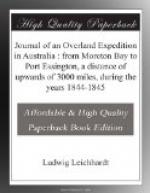Dec. 5.—I determined upon stopping for a day, to allow our cattle to recover. Every body was anxious to procure geese or flying-foxes; and, whilst three of my companions went to the flying-fox camp which we had visited yesterday, loaded with ironstone pebbles for shot, and full of the most sanguine expectations, Brown was busy at the lagoons, and even Mr. Roper stirred to try his good luck. The two met with a party of natives, who immediately retreated at sight of Mr. Roper; but during the afternoon they came to the other side of the lagoon opposite to our camp, and offered us some fish, a Silurus (Mao) and a tench (?) which they had speared in the lagoons. I made a sign for them to come over and to receive, as presents in exchange, some small pieces of iron, tin canisters, and leather belts; which they did; but they became exceedingly noisy, and one of them, an old rogue, tried to possess himself quietly and openly of every thing he saw, from my red blanket to the spade and stew-pot. I consequently sent Brown for a horse, whose appearance quickly sent them to the other side of the lagoon, where they remained until night-fall. Brown offered them half a goose, which, however, they refused; probably because it was not prepared by themselves, as they were very desirous of getting some of the geese which we had not yet cooked. Brown had shot nine geese, and our fox hunters returned with forty-four of the small species.
When the natives became hungry, they ate the lower part of the leaf-stalks of Nelumbium, after stripping off the external skin. They threw a great number of them over to us, and I could not help making a rather ridiculous comparison of our situation, and our hosts, with that of the English ambassador in China, who was treated also with Nelumbium by its rich Mandarins.
The natives seemed to speak a less melodious language, which might be ascribed to the mountainous character of their country. I collected the following names: Kobboyakka, Nobungop, Kanbinycx, Manguradja, Apirk (Apek), Yaganyin, Kolar, Kadgupa, Gnanga Gnanga. Ayir meant stone spear; Ekolpen, jagged fish-spear.
I made the latitude of these lagoons, by an observation of Castor, 12 degrees 23 minutes 19 seconds.
Dec. 6.—The natives visited us again this morning, and it was evident that they had not been with their gins. They invited us to come to their camp; but I wished to find a crossing place, and, after having tried in vain to pass at the foot of the rocky hills, we found a passage between the lagoons, and entered into a most beautiful valley, bounded on the west, east, and south by abrupt hills, ranges, and rocks rising abruptly out of an almost treeless plain clothed with the most luxuriant verdure, and diversified by large Nymphaea lagoons, and a belt of trees along the creek which meandered through it. The natives now became our guides, and pointed out to us a sound crossing place of the creek, which proved to be the




